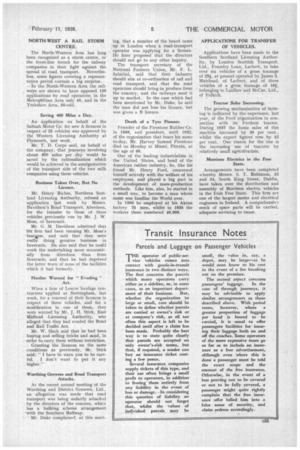Transit Insurance Notes
Page 71

If you've noticed an error in this article please click here to report it so we can fix it.
Parcels and Luggage on Passenger Vehicles THE operator of public-ser1 vice vehicles comes into contact with goods-in-transit insurance in two distinct ways. The first concerns the parcels which many operators carry either as a sideline, or, in some cases, as an important depart. ment of their business. But, whether the organization be large or small, care should be taken to define whether parcels are carried at owner's risk or at company's risk, as all too often this aspect is left to be decided until after a claim has been made. Probably the best way is to state quite clearly that parcels are accepted on only owner's-risk terms, but that, if required, a sender can buy an insurance ticket costing a few pence.
Several insurance companies supply tickets of this type, and their use often brings a small profit to operators, in addition to freeing them entirely from any liability in the event of loss or damage. -In considering this question of liability an operator should not forget that, whilst the values of individual parcels may be small, the value in, say, a depot, may be large—as he would soon know to his cost in the event of a fire breaking out on the premises.
The second aspect concerns
passengers' luggage. In the case of through journeys, it may be advisable to apply similar arrangements as those described above. With period tours, however, where a greater proportion of luggage per head is bound to be carried, it is usual to offer passengers facilities for insuring their luggage both on and off the coaches. Some operators of the more expensive tours go so far as to include an insurance as a free advertisement, although even where this is done a passenger must be told the exact scope and the amount of the free insurance. Otherwise, in the event of a loss proving not to be covered or not to be fully covered, a passenger might quite rightly complain that the free insurance offer hilted him into a false sense of security, and claim redress accordingly.




























































































































































